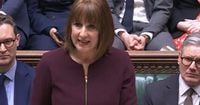The FTSE 100 index rose by 17 points, reaching 8,681, as Chancellor Rachel Reeves delivered her Spring Statement on March 26, 2025. The announcement brought mixed news for the UK economy, with inflation rates cooling slightly and the Office for Budget Responsibility (OBR) adjusting its growth forecasts.
In her address, Reeves highlighted that while the growth forecast for the current year has been cut to 1.0%, it is expected to rise to 1.9% in 2026 and maintain a steady growth of 1.8% in 2027, 1.7% in 2028, and 1.8% in 2029. "Our economy is forecast to be larger at the end of the forecast period than forecast in October," she stated, emphasizing that these numbers translate into real improvements in people’s lives.
Despite the positive outlook, Reeves acknowledged that households are still feeling the effects of past economic turmoil, particularly from the cost of living crisis exacerbated by the previous government. She noted that the OBR now forecasts that individuals will be, on average, £500 better off annually due to the government’s changes.
In terms of fiscal policy, the Chancellor announced a significant increase in defence spending, committing to allocate a minimum of 10% of the Ministry of Defence’s equipment budget to new technologies, including drones and AI. "We will establish a protected budget of £400 million within the Ministry of Defence, a budget that will rise over time for UK defence innovation with a clear mandate to bring innovative technology to the front line at speed," Reeves added.
However, day-to-day spending is set to decrease by £6.1 billion by 2029/30, with growth projected at an average of 1.2% per year, slightly lower than the 1.3% growth anticipated in her previous budget. Public spending is forecasted to rise to 45% of GDP next year before declining to 43.9% of GDP by 2029-30. This includes planned cuts to welfare spending, which are expected to save £4.8 billion.
Reeves also announced measures aimed at cracking down on tax evasion, asserting that £1 billion will be raised through these efforts. "Normal working people are not those evading tax," she emphasized, as she outlined plans to increase expected revenue from tax avoidance measures from £6.5 billion to £7.5 billion, a figure verified by the OBR.
The OBR's forecasts revealed a 54% chance that the current budget could be in surplus by the target year of 2029-30. However, the OBR also predicted a £14 billion increase in the current deficit, estimating it would reach £4.1 billion without new changes from Reeves.
As the Spring Statement concluded, the market reacted positively, with the FTSE 100 gaining 16 points or 0.2% during midday trading, buoyed by strong performances from retailers and tech companies. Notably, Ocado’s shares surged by 16% following an upgrade from JPMorgan, which indicated a "turning tide" in online grocery deals.
Meanwhile, Wm Morrison Supermarkets reported a 2.4% increase in sales, reaching £4 billion for the quarter ending January 26, despite announcing 365 potential job cuts earlier in the week. Chief Executive Rami Baitiéh remarked, "Despite a challenging environment, Morrisons has made exceptional progress in a very short time and that is entirely down to the hard work, positivity, talent and customer focus of the colleagues in our stores, in our foodmaking sites and in our operations across the country." The company has also raised its long-term savings target from £700 million to £1 billion.
In the commodities market, copper prices reached a 10-month peak at US$4.58 per pound, while gold also saw a rise of 0.3% to US$3,053 per ounce. On the other hand, iron ore prices declined by 0.6% to US$103 per dry metric tonne, attributed to ongoing steel production cuts.
House price data released by the ONS indicated a 4.9% increase in UK house prices, reaching an average of £269,000 over the past year. The growth was noted across different regions, with Wales seeing a 6% increase, while London continued to lag behind with the lowest growth.
Despite the positive economic indicators, speculation regarding Reeves's future as Chancellor remains. Bookmakers have suggested a 36% chance that she could be out of her position within the next year, as her fiscal policies have not been well received by the markets thus far. Pat McFadden has emerged as a potential successor, currently favored by bookmakers to take over as the UK’s next finance minister.
As the broader European markets struggled, with the pan-European Euro Stoxx 600 down 0.7%, the UK markets appeared to weather the storm better, supported by the positive sentiment from Reeves's Spring Statement. Investors are now looking ahead to how these policies will play out in the coming months and whether they will yield the intended economic benefits.




